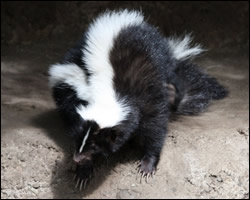 Skunk Removal is a common wildlife problem throughout many urban areas of the United States. The most common complaint with these nuisance pests is the foul skunk smell that may permeate up to a mile.
Skunk Removal is a common wildlife problem throughout many urban areas of the United States. The most common complaint with these nuisance pests is the foul skunk smell that may permeate up to a mile.
Skunks use their spraying as a defense mechanism to warn off predators, and in many cases this may end up being your pet. This foul musk odor comes from the skunks anal glands, the skunk will turn its back, raise its tail, and spray. Skunk odor can be very difficult to get rid of. Professional wildlife removal operators can get rid of skunks and their skunk odor.
Skunks are attracted to pet food and may find their way into garages, basements, under porches, decks, or houses. Skunks have also been known to enter homes through pet doors. These nuisance animals may be dangerous because of the diseases they carry. Striped Skunks care primary carriers of the rabies virus in the United States, and also carry distemper which is deadly to dogs. Not only are the carriers of disease skunks are carriers of fleas, ticks, and mites posing a threat to both people and domestic pets.
If you discover that you have a skunk taking up residence on your property, nuisance wildlife operators can get rid of these pests and neutralize skunk odors – never approach a wild rabid skunk. County animal control agencies are good with domestic animals such as dogs, and cats, but typically do not provide services for nuisance wild animals like skunks. If you suspect skunks, call a wildlife removal solutions operator to solve all your skunk problems.
There are four types of skunks including the Striped Skunk, Hog Nosed Skunk, Hooded Skunk, and Spotted Skunk. The striped skunk is the common skunk known in the United States. This skunk is black with a white stripe down its back. This stripe acts as a warning that is best avoided; the coloring is enough to make many predators retreat.
Skunk Prevention Suggestions:
There are several things you can do to make your property less inviting to skunks.
- Skunks are nocturnal and hate bright lights; flood lights attached to motion sensors will discourage them, at least for a time. This is only a temporary fix, though, as the skunk can get used to the light or find ways around the light
- Skunks are burrowing animals; they will make will make their home underneath houses, sheds, decks, and other above-ground structures. Seal all potential openings that will allow the skunks to enter, skunks can fit through very small holes. Wire mesh, like chicken wire, works well to seal off any potential opening, but should be buried at least one foot deep since these are burring animals. Fill in holes and ditches as well.
- Fencing of gardens, keep bird feeder spills cleaned up, seal off pet doors, and do not leave pet food bowls outside. Remove scrap piles and elevate wood piles that allow opportunity for these pests to make their den.
- Chemical repellents are reported to not be very effective, and need to be reapplied every few days. Poisons are not recommended; no one wants a dead skunk rotting under their house, deck or porch.
Trapping Skunks
Often, people are tempted to try to trap skunks on their own. Be aware, however, that skunks have great confidence in defending themselves against other animals, including humans, and are not likely to back away from a conflict. They’ll spray and bite humans without hesitation and these animals are the number one rabies carrier in the United States. A homeowner may successfully trap and kill an adult skunk, only to end up with baby skunk carcasses rotting under their house, deck, or porch. It can take between one and two years, depending on the size, for a skunk’s body to decompose, and even longer for the odor to dissipate.
If you suspect that you have skunks on your property, leave skunk trapping and skunk removal to wildlife control specialists. A trapped skunk is an angry skunk that feels threatened and is ready to defend itself. A qualified animal control company can humanely trap skunks and have the chemicals to clean and neutralize the skunk smell. Wildlife control operators can also make recommendations on how to prevent skunks from returning. Wildlife professionals are familiar with local laws regarding the trapping and removal of nuisance animals. Wildlife Removal Solutions operators are reputable companies that have all required state and local licensing, and are fully insured.
